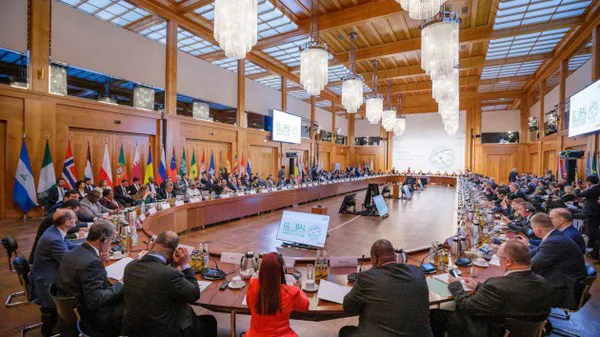Julia Klöckner, Federal Minister of Food and Agriculture, welcomed 71 colleagues from all over the world and representatives of twelve international organisations to Berlin – to the Agriculture Ministers’ Conference during the ministry's Global Forum for Food and Agriculture entitled “Food for all! Trade for Secure, Diverse and Sustainable Nutrition”. The ministers adopted a joint communiqué which was presented to Aidarbek Saparov, Vice-Minister of Kazakhstan, who will be hosting the next WTO Ministerial Conference, Alan Wolff, Deputy Director-General of the WTO and Dr Qu Dongyu, Director-General of the FAO.

Source: BMEL/Photothek
“International trade fights hunger, protects resources and can play an important role in ensuring stability and peace! Without trade, there will be no global food security as some countries are unable to provide for themselves. To this end, we must foster trade and work hand in hand to ensure that the special concerns of agriculture are taken into account. Farmers, including smallholders, must be winners in trade. This requires fairness and transparency. We must ensure that all people benefit from trade, and not just a minority, so that everyone has access to food. Global trade requires global rules and reliable, value-based standards. It is therefore important that we exchange views on these issues at the GFFA. Nowhere else do we have so many agriculture ministers from so many states in one place, it is a unique platform,” underlined Federal Minister Julia Klöckner.
And the minister continued by saying that environmental protection and food safety requirements should not be undermined. She stated that in order to guarantee common standards and continue to reduce market-distorting agricultural subsidies, it was vital to strengthen the role of the World Trade Organisation (WTO). “The resolutions we have adopted today send a strong signal for rule-based free trade!”
In the final communiqué, the Agriculture Ministers’ Conference agreed inter alia on the following objectives:
- global rules for global markets, strengthening of the WTO, bilateral free trade agreements as a contribution to the opening up of markets, reduction of market-distorting support measures;
- strengthening of local, regional and global value chains and promotion of agricultural trade; equitable distribution of welfare gains across all countries and social strata;
- promotion of technical and organisational innovations, e.g. in the field of digitalisation, to increase efficiency and to make the food and agricultural sectors attractive to a new generation of farmers;
- support for smallholders in the form of micro-credits and facilitation of their engagement in cooperatives in order to better integrate them into markets;
- granting of more rights to women and facilitation of their access to markets in order to effectively lift numerous families out of poverty;
- continuation of environmental measures and compliance with international climate agreements; and
- introduction of global standards for sustainable agriculture.
International Digital Council will be established
At the Agriculture Ministers’ Conference, another important step forward was also made in the field of digitalisation. The ministers discussed this topic last year and requested the Food and Agriculture Organisation of the United Nations (FAO) to develop a concept for the establishment of an International Digital Council. This was discussed and supported today. The FAO has now been called upon to implement this concept. The aim is for the Digital Council to advise states on issues of digitalisation and to drive the exchange of ideas and experiences. “The decision to establish an International Digital Council is a milestone. All over the world, digitalisation offers the opportunity to combine the securing of yields with resource conservation, to strengthen rural areas and thus to tackle the root causes of displacement. With this council, we want to reduce the so-called digital divide and improve access to digital technologies - for smallholders across the globe as well”.
For more information:
www.gffa-berlin.de
www.bmel.de
